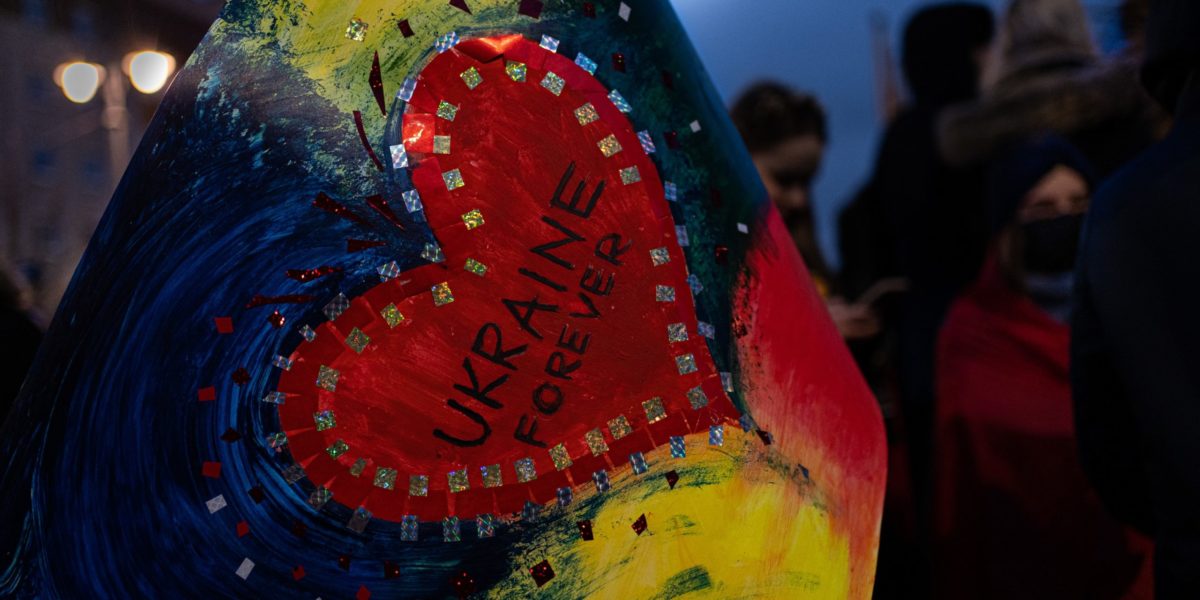Ruslana Hnatchenko considers herself lucky. She left Ukraine weeks before the beginning of Putin’s invasion to study in the United Kingdom.
Hnatchenko’s family remains in Ukraine, where her parents are responsible for looking after her grandmother.
Her grandmother wasn’t in great shape before the invasion. She was already in hospital when Russian troops began their attack. Staff at the hospital were responsible for transporting all patients to the basement of the facility in the event of an air raid.
Hnatchenko’s parents saw what kind of toll the constant changes took on her grandmother and decided to bring her home. Two days later, Hnatchenko says, the hospital was shelled.
“It was pure luck that we managed to get her out of there two days before,” she said, adding that nobody was hurt in that particular shelling, and patients were evacuated from the rubble to safety.
Despite being away from her family and friends, Hnatchenko has continued in her role as fundraising manager for the Sphere Women’s Association NGO, the main LGBTQ organization in the east of Ukraine. She also pointed out that Sphere is a historic group, as “one of the first lesbian feminist organizations” in the country.
In an interview with rabble.ca, Hnatchenko talked about how her work at Sphere has adapted over the past two months, with core projects including a community center in Kharkiv and an annual Women’s Solidarity Week.
When the invasion began in late February, Hnatchenko explained that Sphere organizers kept connected through daily social media posts. Within a week, they began working on a mental health support group, in addition to psychological consultations for community members in Kharkiv.
“We’re working on reforming our project to respond to the current calls of the invasion, as well as starting a financial aid program to support the community,” Hnatchenko said, explaining the NGO’s areas of responsibility “got a little bit blurred” when the war began.
“Activism and NGO work is usually pretty hard,” she said, adding, “especially in times of crisis and war.”
On top of her work with Sphere, Hnatchenko is continuing her studies and navigating the weight of the “emotions involved with having a family there and being worried for them.”
While the area Hnatchenko’s family resides in has so far been free of violence, she acknowledged that “the enemy could get closer” as Russian troops make their way into Eastern Ukraine.
While her family has enough in terms of supplies and food for the meantime, Hnatchenko’s told her three weeks ago that one of two supermarkets in the community closed its doors, putting further pressure on the only grocery store in town.
“It’s a privilege that not everyone has,” Hnatchenko explained. “Even in that town, there are volunteers who are distributing some humanitarian aid and food to others.”
Munich Kyiv Queer helping LGBTIQ people flee Ukraine, seek refuge in Germany
Conrad Breyer is an organizer with Munich Kyiv Queer, an advocacy organization that began in 2012 to help bridge the queer communities of twin cities Munich and Kyiv.
That year marked the first pride march in Kyiv, a march that Breyer noted became violent after police failed to protect participants. In response, Munich Pride decided to invite queer Ukrainians to share the march with their neighbors.
That gesture of good faith soon snowballed into what’s become known as Munich Kyiv Queer.
In an interview with rabble.ca, Breyer called the solidarity shown to LGBTIQ Ukrainians “really beautiful.”
“It was all about political actions, workshops, youth exchanges, and a lot of cultural projects like exhibitions, discussions, and films to improve the human rights situation of LGBTIQ [people] in Ukraine,” Breyer said.
With the war in Ukraine into its second month, Munich Kyiv Queer has shifted “to become a refugee organization.” Organizers have moved to helping queer Ukrainians flee the country to safer locations in the European Union, with a focus on Munich in particular.
Part of their job is to help refugees find accommodations in Munich, navigate the German bureaucratic processes involved in seeking asylum, and teach newcomers the German language.
“I must say, after two years of the pandemic, we’ve found a new energy in this and we’re a highly motivated team,” Breyer said. “[We’re] even growing right now because all of the community wants to help, and that’s a phenomenon not only in Munich, but all over the world.”
While Breyer remains hopeful the war will end, he called Putin’s actions “a nightmare” that has shaken Ukrainians to their core.
Holding back tears, Breyer explained that his husband is from Kyiv and not all of his relatives have been able to escape, “something which is really hard to digest.”
Breyer noted there are many LGBTQ individuals staying in Kyiv to help their communities. Some are even fighting in the army. Others, he remarked, are desperate. Many gay men and trans people have been forced to remain in Ukraine because their passports identify them as men.
Breyer and his husband have heard stories from friends in Odessa, whose walls were shaking from the impact of bombs. Their friends were desperate to leave Ukraine, but “there was no food or fuel.”
Instead, Breyer said his friends were forced to take a bus to flee, and that was after the bus driver charged them four times the price of a ticket.
Breyer has kept himself busy helping Ukrainians with medical care, accomodations, money, and food.
“There are many desperate people who are really in shock, calling us saying ‘I want to leave. Help me,’” he said. “We can send them money and try to comfort them and bring them to shelters where they can hide, but they can’t leave the country right now.”



